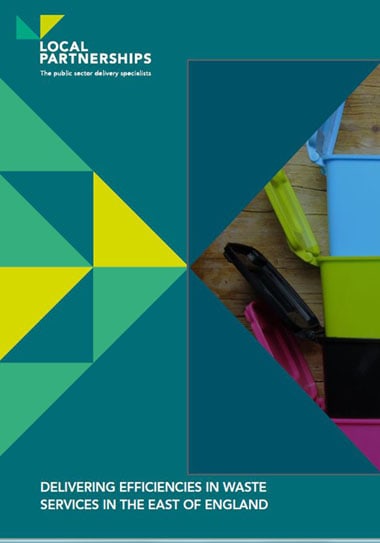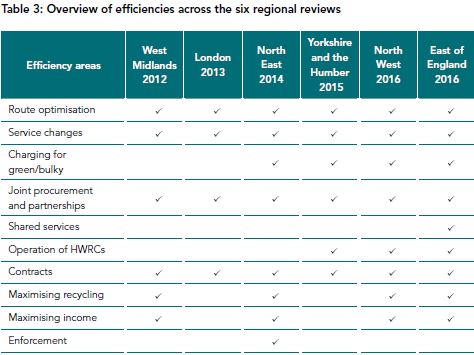Local Partnerships is a joint venture run by the Treasury and the Local Government Association and produces detailed studies on waste and other issues within local government in England.
Its latest report, just published into the high recycling East of England area – stretching from Three Rivers in Hertfordshire to Norfolk in East Anglia – estimates that “savings and avoided costs of £22 million” have been made by the authorities who took part in the review. The area has a population of 5.8 million with a mix of rural and urban areas.

The study is the sixth regional review undertaken by Local Partnerships focusing on efficiencies achieved in waste management. The previous five reviews, focusing on the North West, Yorkshire and the Humber, North East, West Midlands and London provided a wealth of information to decision makers and stakeholders.
Local Partnerships said it considered the examples provided throughout the report would enable other councils to benefit from these experiences: “particularly in terms of examining their own services and seeing if the experiences here could be applied to their authority and support them in making their own savings”.
And, the organisation emphasised: “As with the previous reviews the examples shown by authorities in the East of England have not just focused on one specific area or aspect of waste management, but have explored a range of options to achieve efficiencies. This is clearly reflected in the wide diversity of examples featured.”
Staffing
However, one drawback of finance cuts was found that in terms of cooperating with the research for the report, some councils had had staffing levels cut so much that they could not look up from the day job. This, it was noted, could affect the ability of staff to deliver anything more than the day-to-day requirements so hampering any development of a long-term strategic approach.
Factors of note picked out by the report’s authors include that the overwhelming efficiency driver for most of the authorities in the review is economics with a need to generate financial savings, while safeguarding the existing level of service where possible.
And, in addition, it is emphasised that “charging for garden waste services, which feature prominently in this region, can have an impact on tonnage collected from the kerbside and therefore recycling rates being achieved.”
The researchers found that unlike other areas in England, the East’s range of efficiency areas is much broader.
Round efficiencies in terms of the time it takes to collect the waste or recyclate and number of vehicles and crew required have been found to be a continuing priority for a lot of authorities and the East of England region is no exception, says Local Partnerships.
One example given is South Norfolk, where a complete re-optimisation of the household waste and
recycling collection routes was required in response to a number of issues including: a variation in the disposal point; increasing households; and, an increase in the commercial collection services. The optimisation resulted in the collection taking place over four days as opposed to five (but with the same contracted hours), enabling further staff savings and a reduction in disruption resulting from Bank Holidays as collections now take place Tuesday to Friday). The new service routes have just been put into situ but with a projected annual saving of circa £300,000.
Central Bedfordshire is cited for its retendering of the HWRC management contract, and a new pricing schedule is expected to provide £435,000 savings in 2016/17. A new contract for street sweeping treatment rather than sending to landfill will generate a saving of £85,000 over this year and next. Re-tendering the residual and recycling disposal contracts provided £1.2 million savings in 2013/14 from moving to treatment rather than landfill and from cost to income for recyclate.

Finance models
The Local Partnerships Report looks at Hertfordshire County Council which operates an ‘Alternative Financial Model’ (AFM) designed to incentivise lower performers to improve amd support more directly those authorities that pursue higher recycling targets and prioritises specific waste behaviours that recognise relative value, i.e. genuine waste minimisation being worth more than recycling.
Collections
In Maldon, hot foil printing on the lid of the bin ‘No Food Waste’, to encourage residents to use the food caddy has been very successful in diverting food waste from the general refuse and into the anaerobic digesting facility generating savings at the WDA level.
And, the study reports that In North Norfolk, the authority ceased the delivery of collection day change notifications for each and every bank holiday, instead relying on the annual collection calendar to inform householders of the day changes, along with website and social media promotion. In order to facilitate this, they also changed the time of year for calendar delivery to households from April to December (so that we had certainty around changes at Christmas). This saved £10,000 per annum.
Lessons learnt
The impact of the experiences and lessons learnt are also detailed. For example, Central Bedfordshire felt that being tied in to long term contracts did not necessarily mean savings and efficiencies while Cambridgeshire county councils made the point that changes within long term contracts can require “significant time and resources to complete”.
On markets, Peterborough gave advice that the market needed to be approach with confidence and with “sensible apportionment of the risks between both parties”. Basildon council had learnt that it was necessary to be prepared to face some risk and this was a view matched by Great Yarmouth.
For Norwich City, having a group of individuals who are prepared and able to provide the commitment and momentum is what is needed to drive changes forward.
The biggest saving was claimed by Norfolk Waste Partnership at £3 million per annum for partnership working although the Suffolk Waste Partnership with West Suffok, Waveney, Babergh and Mid Suffolk councils saved £1 million a year by charging for garden waste.
Related links











Subscribe for free